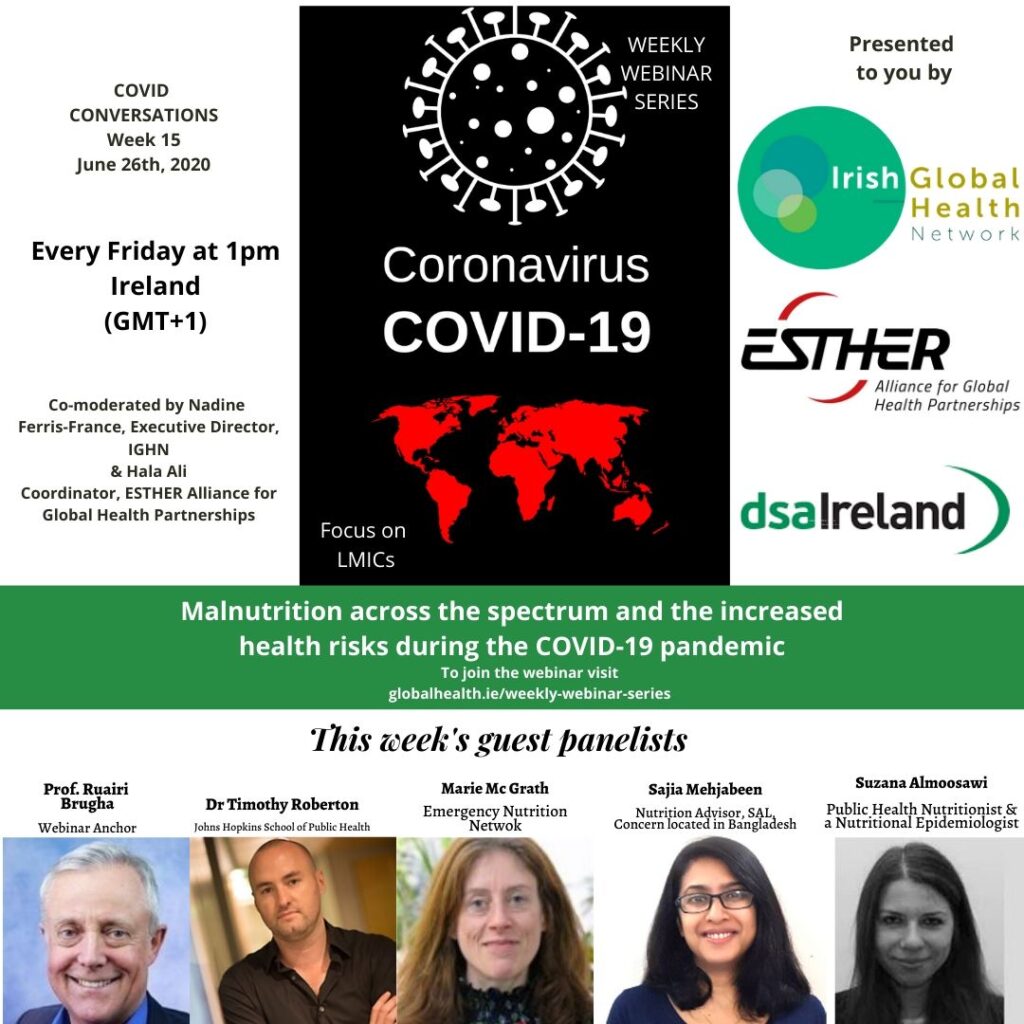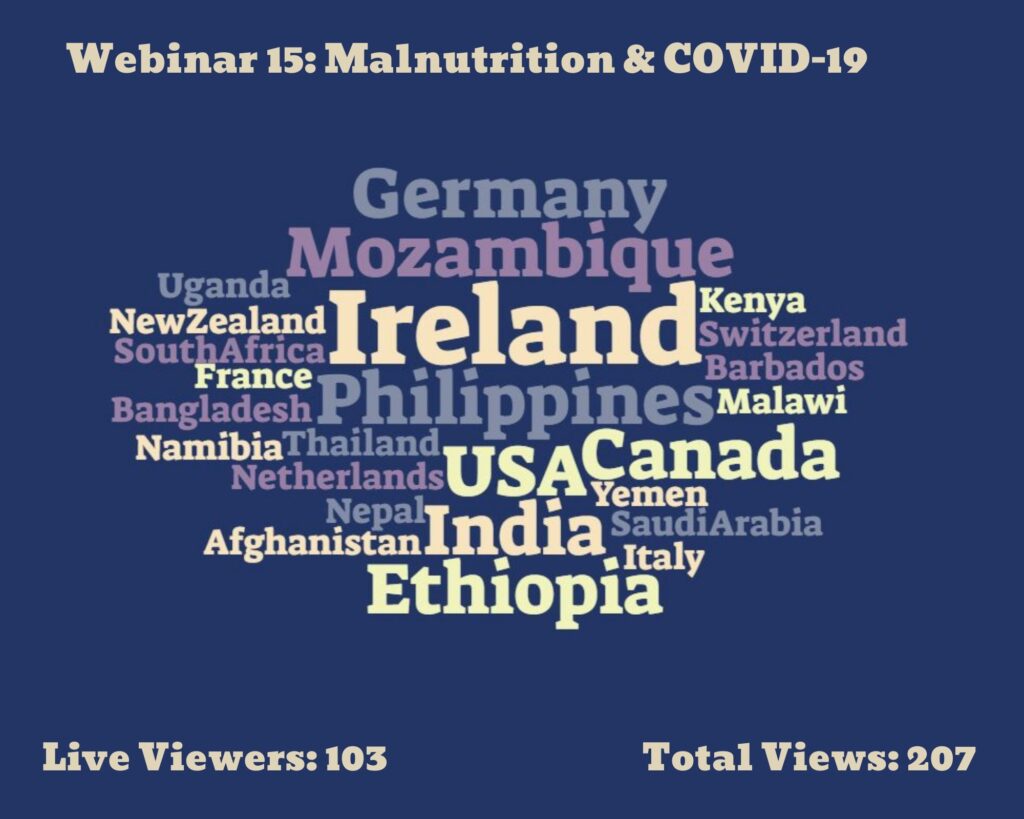Conversations on COVID-19 15th Webinar: Malnutrition across the spectrum and the increased health risks during the COVID-19 pandemic
 WEBINAR SERIES: WEEK FIFTEEN Malnutrition across the spectrum and the increased health risks during the COVID-19 pandemic
WEBINAR SERIES: WEEK FIFTEEN Malnutrition across the spectrum and the increased health risks during the COVID-19 pandemic
The fifteenth webinar was held on Friday 26/06/2020 at 12:00 pm GMT/1PM Irish Time.
This webinar is co-organized with the Development Studies Association of Ireland’s Nutrition and Health Study Group. DSAI is a network and space for dialogue between development researchers, policy makers and practitioners.
For more information on DSAI Nutrition and Health Study Group, CLICK HERE
For more information on DSAI generally, CLICK HERE
The full suite of resources shared by speakers is available under each of their individual recordings, along with a summary of the points they made. A full list of additional resources shared by participants and hosts during the webinar can be found at the bottom of the page.
VIEW THE WEBINARYour feedback is important to us so that we can continue to share learnings, insights and practices relevant to those working in the LMIC community. Please take the time to complete our evaluation at the button below so that we can continue to improve the series.
COMPLETE WEBINAR EVALUATIONA SUMMARY OF POINTS MADE
Dr Timothy Roberton, Johns Hopkins School of Public Health
“The greatest potential cause of childhood mortality was an increase in Wasting.. It increases the susceptibility…to die from other infectious disease….for maternal mortality… the things that would lead to the greatest number of maternal deaths would be a reduction in emergency obstetrics services”
The COVID-19 pandemic has caused a disruption to routine care and modelling studies exploring the likely consequences for maternal and child health have been conducted. Breastfeeding/ WASH/ or longer term consequences of contraception weren’t included in these modelling studies.
Across the 3 scenarios, reduced coverage of four childbirth interventions (parenteral administration of uterotonics, antibiotics, and anticonvulsants, and clean birth environments) account for approximately 60% of additional maternal deaths. The increase in wasting prevalence would account for 18–23% of additional child deaths and reduced coverage of antibiotics for pneumonia and neonatal sepsis and of oral rehydration solution for diarrhoea would together account for around 41% of additional child deaths.
Rather than simply focusing on an individual interventions, reflecting on strategies and delivering packages of interventions though community workers is important. The main causes of childhood mortality (under five year) are from very treatable conditions with pneumonia, malaria, neonatal sepsis or diarrhoea and if they are unlikely to get appropriate treatments (antibiotics, zinc and rehydration solutions) for these its likely to contribute to an increased proportion of additional deaths estimated.
Marie McGrath, Emergency Nutrition Network, (ENN)
“There has also been gaps or challenges in applying and interrupting the evidence information… with…..challenges with misinformation and misinterpretation of the information out there….so who you go to is really important…. 47 Million children in the world are wasted and less than a quarter of those get treated and ……we are having to use the word pandemic to get attention on nutrition”
ENN is a partner with the Global Technical Assistance Mechanism for Nutrition (GTAM) which is endorsed by over 40 global nutrition clusters partners. They have responded to the COVID-19 challenges by providing technical policy briefs/ updates on UN websites and consensus papers and support in real time to those working in the field. Supporting and collaborating with field workers, NGO’s UN agencies ensure that accurate evidence based information is provided and works to clarify misinformation, e.g. work done to clarify misinformation about COVID-19 which separated breastfeeding mothers from babies.
Challenges for nutrition and health include but are not limited to: suspended or disrupted health provision of wasting services; reallocation of staff & space; lack of appropriate PPE & equipment; disinfectant issues of equipment & space and reduced capacity of centres dues to appropriate spacing with limited triage space.
Challenges with screening for wasting include: updating management protocol and risks associated with attending for treatments and lack of interventions; the frequency of visits and supply of ready to use therapeutic foods with disrupted food systems and agriculture impacting on food insecurity. Many low income countries have fragile health systems and/or are affected by humanitarian crisis and many are affected by food security which makes them very vulnerable to the impact of COVID-19.
To find out more about ENN, CLICK HERE
For more info on the ENN COVID-19 and nutrition programming, CLICK HERE
Marie’s Resources:
- Guidance for nutrition in emergencies practitioners on COVID-19Global Technical Assistance Mechanism on Nutrition (GTAM):
- Technical Assistance for Nutrition in Emergencies
- Wasting in the context of COVID 19 Brief
- Infant feeding in the context of COVID 19 Brief
- Live log of technical adaptations to programming
Breastfeeding, MCH and COVID 19:
- Breast-Feeding and COVID-19: Scientific brief
- FAQs on breastfeeding in the context of COVID 19
- Repository of Updates on Maternal and Child Health, Nutrition and COVID-19 (JHU)
- Global policy guidance on infant and young child feeding in emergencies
Sajia Mehjabeen, Nutrition Advisor, Concern Worldwide
“Opportunity for us to realise again that Investing in systems strengthening should be the priority… even in the fragile countries the preparedness and risk planning the importance of data and the importance of prediction analysis is….. more important than ever and the opportunity for us to build the system so we can respond to future emergencies …..Empowering the care giver ….and encouraging the community as a whole”
A challenge for many NGO’s with COVID-19 is balancing the health risk with the chronic conditions that are impacting children’s mortality every day, whilst also protecting staff and health care workers in providing essential care for malnourished children and their families.
Concern is constantly reviewing their existing preventative and interventions programmes with increasing concern that more vulnerable groups will be at risk with essential services on hold. New innovations implemented include developing isolation spaces at health centres and extending Mother MUAC to health facilities and new technologies with mobile phones and WhatsApp. However, these come with challenges: insufficient networks and many individuals /communities without access to mobile phones.
Knowledge gaps for management, treatment policy and guidelines for those severely malnourished children that have COVID-19 is another issue. Concern has shared their guidance document with ENN and this was been circulated more widely. Urban and slum dwelling present a challenge for social distancing as it’s not possible or feasible for people in these conditions to self-isolate.
To find out more about Concern, CLICK HERE
To know more about Concerns work on health and nutrition, CLICK HERE
Suzana Almoosawi, Public Health Nutritionist, Nutritional Epidemiologist
“The main issues is the lack of data if we don’t have data on the individual and their nutritional status how are we able to determine the best solution for managing their health or creating public health interventions”
NCDs are even more important given the current pandemic and nutrition plays an important role in the immune system in both the case of over- and under-nutrition. Poor nutrition not only contributes to poor health and increase susceptibility to COVID-19 infection; once the person is infected it becomes more challenging to manage if malnourished or with NCD e.g. their glycaemic control if Diabetes present.
Over-nutrition and obesity is prevalent in many low- to middle-income countries and it can easily mask key micro-nutrients deficiencies as there is a risk of assumptions of good health when not underweight. Importance of identifying nutrition with appropriate tools as a primary cause of poor health and giving it the priority needed. Challenges with assessment and identification of peoples nutritional status and once identified as malnutrition there is often poor continuation of treatments from hospitals to community settings.
To find out more about NNEdPro Global Centre for Nutrition and Health, CLICK HERE
- NNEdPro TF COVID Toolkit
- Scaling UP Nutrition in Morocco
A 10-point summary on diet, nutrition and the role of micronutrients
Webinar Anchor: Ruairi Brugha, Professor Emeritus
To view his contribution, click here
“The Pandemic from COVID 19 is being followed by a pandemic of undernutrition”
Download Ruairi’s Presentation HERE
Ruairi’s Resources
- COVID-19 pandemic and challenges for socio-economic issues, healthcare and National Health Programs in India
- The impact of COVID-19 and strategies for mitigation and suppression in low- and middle-income countries
- Food insecurity will be the sting in the tail of COVID-19
- Avoiding indirect effects of COVID-19 on maternal and child health
- Food insecurity will be the sting in the tail of COVID-19
Final Take Away Points
- Nutrition should be the centre for every response regardless of COVID 19
- Importance of data collection documenting knowledge/ lessons learnt/ sharing of information/ policies and guidelines and encouragement to get involved with nutrition
- Policy makers should be considering all the trade-offs and costs benefits and indirect consequence of health impacts when implementing programmes
Further Resources:
- Worldometer
- Policy Brief: The Impact of COVID-19 on Food Security and Nutrition
- Programmatic Adaptation Support in the Context of COVID-19
- Risk of COVID-19 complications in Children affected by Wasting
The Guardian: “World faces worst food crisis for at least 50 years, UN warns”

CATEGORIES
- Restore Humanity Campaign
- Equity in Action Blog
- Training Programmes
- Sponsorship
- Vaccine Equity
- Get Global – Global Health Talks
- Student Outreach Team
- Get Global Young Professionals Talk Global Health
- Global Health Matters – Live Event Series
- Global Health Matters – IGHN Live Event Series
- An initiative of Irish Global Health Network
- ESTHER Ireland and ESTHER Alliance for Global Health Partnerships
- Global Health Matters – Webinar Series
- ESTHER
- IGHN Conferences
- Global Health Conference 2020
- Women in Global Health – Ireland Chapter
- ESTHER Partnerships
- Weekly Webinar Series
- 4th Global Forum on HRH
- Access to Medicines
- Archive Page Weekly COVID Webinars
- Clean Cooking 2019
- Climate Change and Health Conference 2017
- Conference Abstracts
- Conference Materials
- Covid FAQ
- COVID Funding Opportunities
- COVID-19
- COVID-19: Gender Resources
- Dashboard and online resources
- Education
- ESTHER Alliance
- Events
- Events & News
- Funding covid
- Global Health Exchange 2018
- Global Health Exchange 2019
- Global Health symposium 2019
- Health Workforce/HRH
- Homepage Featured
- Homepage recent posts
- IFGH 2011-2012 Conference and Events
- IFGH 2014 Conference
- IFGH Multimedia
- Irish AIDS Day 2017
- Irish News and Feeds
- Key Correspondent Articles
- Key Correspondent News
- Maternal Health
- Multimedia
- News
- News & Events
- Newsletter
- Opportunity
- Our LMIC's Resources for COVID19
- Partner Country News and Feeds
- Past Events
- Policy
- Presentations
- Recurring events
- Reports & Publications
- Research
- Resources
- Student Outreach Group
- Students Corner
- TEDTalks
- TRAINING COURSES FOR HEALTH CARE PROFESSIONALS
- Uncategorized
- Upcoming Events
RECENT POSTS

Impact testimonies- Lombani

Impact Testimony – Shadrick

Power, Inequality, Decolonisation – and Living My Recovery By Bronwyn April

Global Health Without Borders: Reflections on the Power of Diverse Voices

IGHNxEU – Empowering Women for a Healthier Europe

